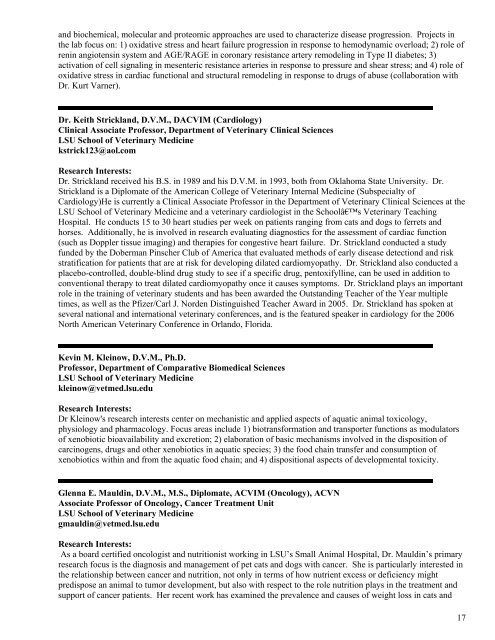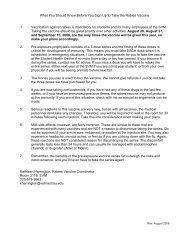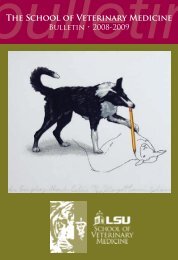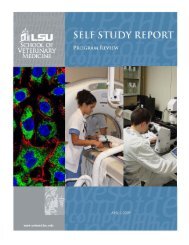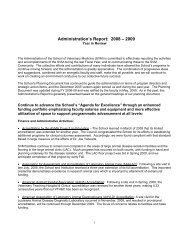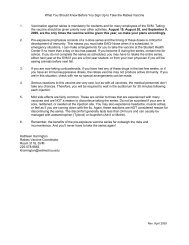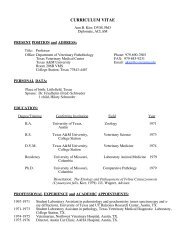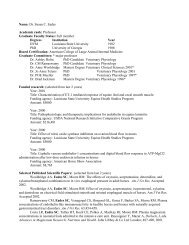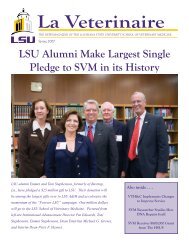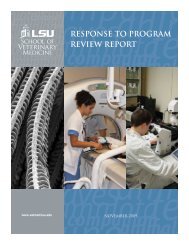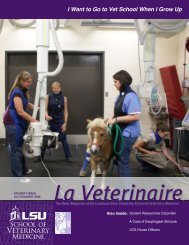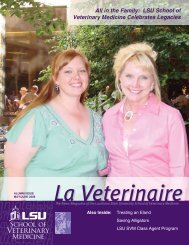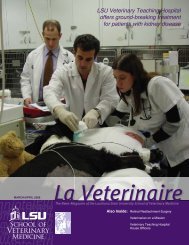2006 merck/merial - School of Veterinary Medicine - Louisiana State ...
2006 merck/merial - School of Veterinary Medicine - Louisiana State ...
2006 merck/merial - School of Veterinary Medicine - Louisiana State ...
Create successful ePaper yourself
Turn your PDF publications into a flip-book with our unique Google optimized e-Paper software.
and biochemical, molecular and proteomic approaches are used to characterize disease progression. Projects inthe lab focus on: 1) oxidative stress and heart failure progression in response to hemodynamic overload; 2) role <strong>of</strong>renin angiotensin system and AGE/RAGE in coronary resistance artery remodeling in Type II diabetes; 3)activation <strong>of</strong> cell signaling in mesenteric resistance arteries in response to pressure and shear stress; and 4) role <strong>of</strong>oxidative stress in cardiac functional and structural remodeling in response to drugs <strong>of</strong> abuse (collaboration withDr. Kurt Varner).Dr. Keith Strickland, D.V.M., DACVIM (Cardiology)Clinical Associate Pr<strong>of</strong>essor, Department <strong>of</strong> <strong>Veterinary</strong> Clinical SciencesLSU <strong>School</strong> <strong>of</strong> <strong>Veterinary</strong> <strong>Medicine</strong>kstrick123@aol.comResearch Interests:Dr. Strickland received his B.S. in 1989 and his D.V.M. in 1993, both from Oklahoma <strong>State</strong> University. Dr.Strickland is a Diplomate <strong>of</strong> the American College <strong>of</strong> <strong>Veterinary</strong> Internal <strong>Medicine</strong> (Subspecialty <strong>of</strong>Cardiology)He is currently a Clinical Associate Pr<strong>of</strong>essor in the Department <strong>of</strong> <strong>Veterinary</strong> Clinical Sciences at theLSU <strong>School</strong> <strong>of</strong> <strong>Veterinary</strong> <strong>Medicine</strong> and a veterinary cardiologist in the <strong>School</strong>â€s <strong>Veterinary</strong> TeachingHospital. He conducts 15 to 30 heart studies per week on patients ranging from cats and dogs to ferrets andhorses. Additionally, he is involved in research evaluating diagnostics for the assessment <strong>of</strong> cardiac function(such as Doppler tissue imaging) and therapies for congestive heart failure. Dr. Strickland conducted a studyfunded by the Doberman Pinscher Club <strong>of</strong> America that evaluated methods <strong>of</strong> early disease detectiond and riskstratification for patients that are at risk for developing dilated cardiomyopathy. Dr. Strickland also conducted aplacebo-controlled, double-blind drug study to see if a specific drug, pentoxifylline, can be used in addition toconventional therapy to treat dilated cardiomyopathy once it causes symptoms. Dr. Strickland plays an importantrole in the training <strong>of</strong> veterinary students and has been awarded the Outstanding Teacher <strong>of</strong> the Year multipletimes, as well as the Pfizer/Carl J. Norden Distinguished Teacher Award in 2005. Dr. Strickland has spoken atseveral national and international veterinary conferences, and is the featured speaker in cardiology for the <strong>2006</strong>North American <strong>Veterinary</strong> Conference in Orlando, Florida.Kevin M. Kleinow, D.V.M., Ph.D.Pr<strong>of</strong>essor, Department <strong>of</strong> Comparative Biomedical SciencesLSU <strong>School</strong> <strong>of</strong> <strong>Veterinary</strong> <strong>Medicine</strong>kleinow@vetmed.lsu.eduResearch Interests:Dr Kleinow's research interests center on mechanistic and applied aspects <strong>of</strong> aquatic animal toxicology,physiology and pharmacology. Focus areas include 1) biotransformation and transporter functions as modulators<strong>of</strong> xenobiotic bioavailability and excretion; 2) elaboration <strong>of</strong> basic mechanisms involved in the disposition <strong>of</strong>carcinogens, drugs and other xenobiotics in aquatic species; 3) the food chain transfer and consumption <strong>of</strong>xenobiotics within and from the aquatic food chain; and 4) dispositional aspects <strong>of</strong> developmental toxicity.Glenna E. Mauldin, D.V.M., M.S., Diplomate, ACVIM (Oncology), ACVNAssociate Pr<strong>of</strong>essor <strong>of</strong> Oncology, Cancer Treatment UnitLSU <strong>School</strong> <strong>of</strong> <strong>Veterinary</strong> <strong>Medicine</strong>gmauldin@vetmed.lsu.eduResearch Interests:As a board certified oncologist and nutritionist working in LSU’s Small Animal Hospital, Dr. Mauldin’s primaryresearch focus is the diagnosis and management <strong>of</strong> pet cats and dogs with cancer. She is particularly interested inthe relationship between cancer and nutrition, not only in terms <strong>of</strong> how nutrient excess or deficiency mightpredispose an animal to tumor development, but also with respect to the role nutrition plays in the treatment andsupport <strong>of</strong> cancer patients. Her recent work has examined the prevalence and causes <strong>of</strong> weight loss in cats and17


